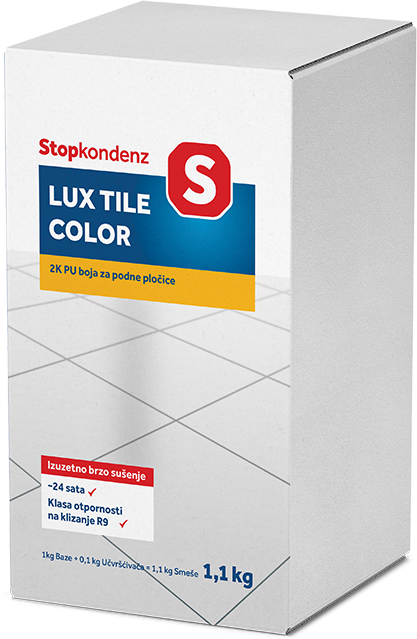LUX TILE COLOR

LUX TILE COLOR
Application
Universally applicable in interior and exterior on substrates such as tiles (wall and floor), bathtubs and shower trays, concrete, steel, asphalt, wood.
Features
It can be walked on after 24 hours (20°C / 55% relative humidity), good resistance to sunlight, good adhesion to tiles, very low tendency to soiling, very good resistance, slip resistance class R9.
Resistance to water, car tire marks, motor oils, diesel, mineral oils, road salt solution, plasticizers, alcohol, mild household cleaners.
Dilution
Ready to use. If necessary, it can be thinned to a maximum of 10% with Jaeger Thinner 97.
Open time for work
Approximately 3 hours at 20°C (shorter time at higher temperatures).
Mixing ratio
10:1 (parts by weight) with LUX TILE COLOR fastener.
Application on ceramic tiles
The tiles must be clean, dry, free of dirt and scale. Joints must be stable and solid. Close all possible cracks beforehand.
Application to bathtubs
Suitable for enameled and acrylic bathtubs. First thoroughly clean the bathtub, remove limescale and rinse the bathtub, smooth the surface (with 120 to 320 grit sandpaper). All surface irregularities must be removed. Rinse and allow to dry thoroughly before coating. First, fill all possible holes/openings with epoxy putty and matt them after drying (enameled tubs). Drying the tub before use for at least 5 days at 20°C.
Application on concrete, screed
Mineral substrates must be installed well before the start of painting. New concrete must be at least 4-6 weeks old. The substrate must be dry, clean, grease-free and stable, loose and unstable layers must be removed. Concrete and screed must still have sufficient absorbency to ensure good adhesion. Remove any remaining glue or cement on the surface by sandblasting, grinding or washing with citric acid solution. Clean all previously used, greasy concrete surfaces with alkaline cleaning agents. Wash with plenty of water or a jet of steam. Wait for the surfaces to dry well.
Application on steel
The substrate must be dry and clean, without rust, limescale, grease and chemical contaminants.
Application to glass
Not recommended.
Application on plastic
Perform preliminary tests to verify adhesion.
Recommended tool
Solvent-resistant roller with a hair length of 6 mm, for example, made of polyamide.
It is also possible to apply airless devices (a 3 mm nozzle is recommended).
Cleaning tools
With Jaeger's Thinner 97.
Packaging
1kg Base + 0.1 kg Fastener = 1.1 kg Mixtures
Consumption
3 – 4 m2/kg per layer.
Drying (at relative humidity 55%):
At 5°C ~ 6 days
At 10°C ~ 5 days
At 20°C ~ 24 hours
INSTRUCTIONS FOR APPLICATION
Check the condition of the substrate - tiles
Check the stability, connection between the tiles and their substrate.
Preparation
Tiles must be clean, dry, free of dirt and scale.
The joints must be stable and firm.
Close all possible cracks beforehand.
Remove silicone joints.
Mixing materials
Mix the base and hardener and mix with a mechanical mixer for at least 3 minutes.
Open time for work
The material you have mixed can be used for the following 3 hours (at 20 ° C) after mixing, after which the mixed material can no longer be used. It is not necessary to mix all the material at once. But that amount you mix up you need to use in the next 3 hours. What matters is the proportion – mixing ratio, base : the hardener is 10:1 (weight parts)
Applying the first layer of paint.
The recommended tool is a solvent-resistant roller with a pile length of 6 mm, for example made of polyamide.
It is also possible to apply airless devices (a 3 mm nozzle is recommended).
Applying the second layer of paint
You can apply the second layer of paint, undiluted, after 12 hours of drying of the first layer.
Important note: Use freshly mixed material!